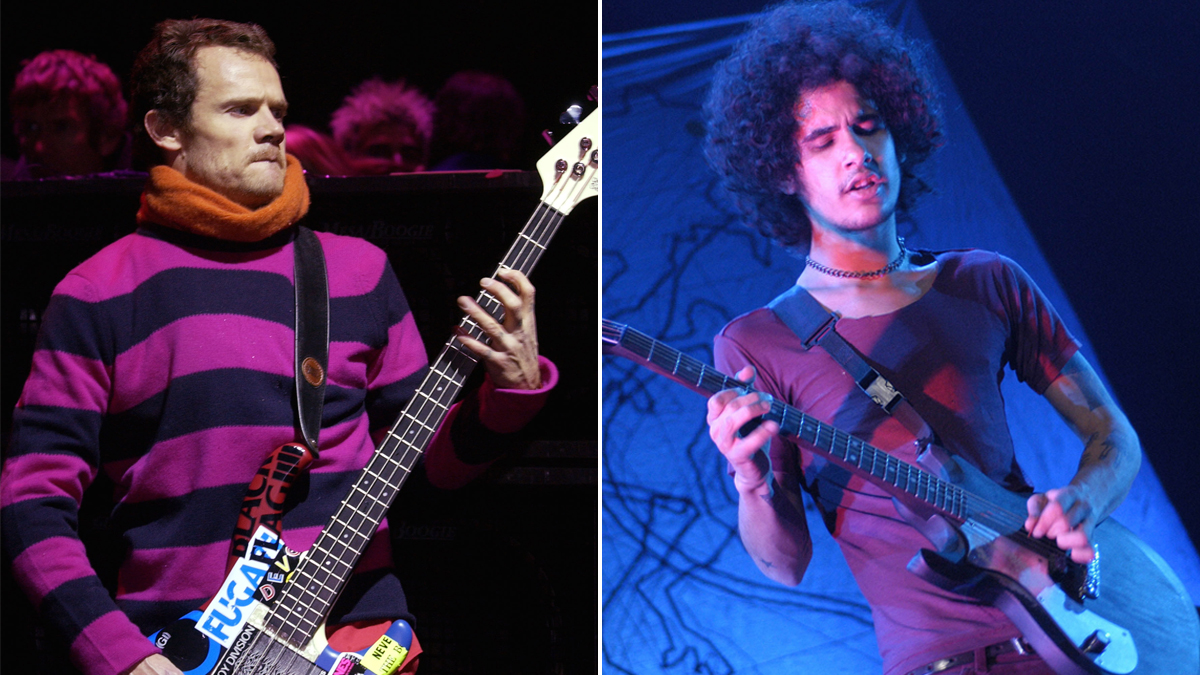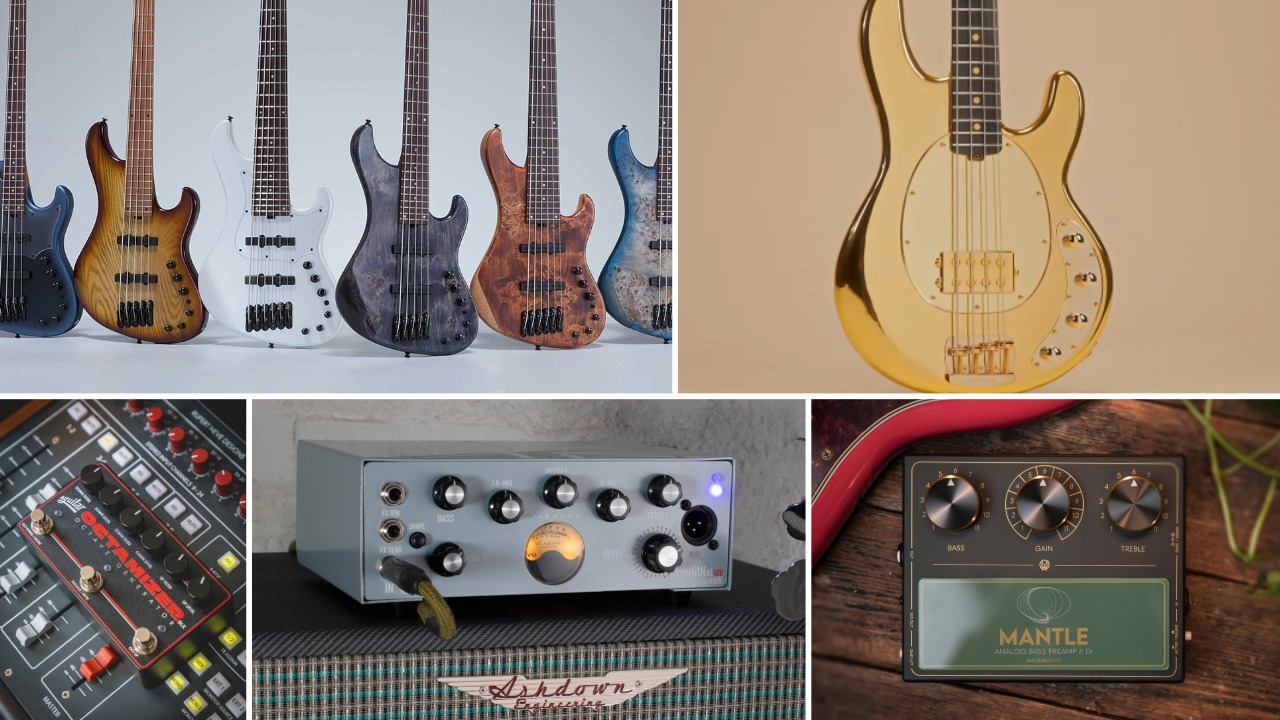Flea played bass on the Mars Volta’s best album – but you probably never noticed
A radically different bass rig meant the Red Hot Chili Peppers funkateer’s contributions might have flown under your radar

Given the mercurial nature of Cedric Bixler-Zavala and Omar Rodríguez-López’s musical predilections, nouveau prog darlings the Mars Volta have covered a lot of sonic ground since their 2001 inception – sometimes to their fans’ chagrin. But few would argue that their Rick Rubin-produced 2003 debut, De-Loused in the Comatorium, is their finest work, and one of the best rock albums of the 2000s.
Rodríguez-López’s wiry guitar playing and Jon Theodore’s furious kit workouts remain touchpoints for what made the record such a masterwork, but the bass playing – and, indeed, the bass player – are often overlooked. Which is particularly surprising when you consider that bassist is Flea.
The Red Hot Chili Peppers funk devotee is one of the most distinctive players of the past half-century, and as such, his contributions tend to erupt from a mix. Yet a number of factors conspired to make his presence an altogether more under-the-radar affair.
This apparatus must be unearthed
Following the departure of original bassist Eva Gardner shortly after the release of debut EP Tremulant, the Mars Volta were in need of some low-end assistance to track their forthcoming full-length.
Producer Rick Rubin flicked through his extensive black book of all-star musicians and arrived at Flea, who agreed to join the sessions at the Los Angeles mansion where Red Hot Chili Peppers recorded their seminal 1991 record Blood Sugar Sex Magik, and where the Mars Volta would record their own opus. (Flea’s RHCP bandmate John Frusciante would eventually contribute additional guitar and synthesizer treatments to De-Loused’s Cicatriz ESP, too.)
Rodríguez-López and Gardner had written many of the basslines prior to the album’s recording, leaving Flea to embellish these parts and add additional flavor to the record’s many extended jams.
Yet the RHCP bass great didn’t anticipate the level of control the band sought over his contributions, which extended right down to his rig.
All the latest guitar news, interviews, lessons, reviews, deals and more, direct to your inbox!
“When Flea played bass on the De-Loused record, they made him play a Fender bass,” subsequent Mars Volta bassist Juan Alderete told Bass Player in 2005. “He came down with all his gear, and they just said, ‘Man, can you please play this?’”
That bass was a ’64 Fender Precision, run through an Ampeg SVT head and 8x10 cabinet. Tones were recorded using a Neumann FET 47 mic on the cabinet and a Demeter DI, before both signals were compressed by a Teletronix LA-2A.
This was a far cry from Flea’s setup at the time, which typically relied on humbucker-loaded Modulus basses and Gallien-Krueger heads – the De-Loused rig yielded a more classic tone less prone to punch a hole through a mix. (Nearly 20 years later, Flea would switch to Ampeg SVTs for his work with the Chili Peppers.)
“It was a slightly different sound for Flea, but he is such a talented musician that he fit in perfectly,” engineer Dave Schiffman told Mix Online. “The bass needed to be full and present, because, essentially, the bass was the foundation of every track.”
Flea’s bass would go on to appear on eight of the album’s 11 songs, bar Televators and Ambuletz. Session great Justin Meldal-Johnsen handled stand-up bass on the former, while Rodríguez-López tackled the latter’s electric tones himself.
Mars attacks
Upon its release in June 2003, De-Loused in the Comatorium foregrounded Bixler-Zavala’s piercing vocals and Rodríguez-López’s frenetic guitar overdubs, with the bass relatively subdued in the mix compared with other alt-rock albums of the era.
Yet while his playing lacks its trademark tonal snarl, Flea’s musical voice is in evidence if you listen for it. Roulette Dares (The Haunt Of) showcases those signature arpeggios and rapid-fire fingerstyle. 12-minute epic Cicatriz ESP wouldn’t be the same without the low-end odysseys underpinning the guitar wigouts. Take the Veil Cerpin Taxt features a bass solo that wouldn’t sound out of place in a live RHCP jam.
While Flea added trumpet to De-Loused’s 2005 followup, Frances the Mute, his low-end collaborations with Rodríguez-López and Bixler-Zavala wouldn’t resume until the sole 2014 release from punk-edged supergroup Antemasque.
But despite reports of a sophomore effort, further material from the project has yet to surface. Instead, Rodríguez-López and Bixler-Zavala collaborated on new output under their most influential monikers, first with At the Drive-In and then the Mars Volta itself.
Yet it’s hard to imagine any new material landing with quite the same impact as De-Loused, which remains a landmark release that continues to spellbind and perplex in equal measure – and its all-star call sheet is part of that eternal magnetism.

Mike has been Editor-in-Chief of GuitarWorld.com since 2019, and an offset fiend and recovering pedal addict for far longer. He has a master's degree in journalism from Cardiff University, and 15 years' experience writing and editing for guitar publications including MusicRadar, Total Guitar and Guitarist, as well as 20 years of recording and live experience in original and function bands. During his career, he has interviewed the likes of John Frusciante, Chris Cornell, Tom Morello, Matt Bellamy, Kirk Hammett, Jerry Cantrell, Joe Satriani, Tom DeLonge, Radiohead's Ed O'Brien, Polyphia, Tosin Abasi, Yvette Young and many more. His writing also appears in the The Cambridge Companion to the Electric Guitar. In his free time, you'll find him making progressive instrumental rock as Maebe.



